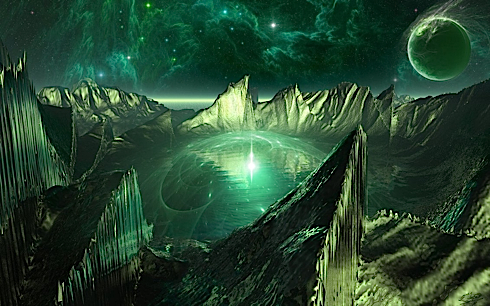Undetectable Technology
[Translations: Japanese]
Karl Schroeder, science fiction author of the novel Permanence, writes about the Fermi Paradox. The Fermi Paradox says that if there is an infinite universe there must be an infinite number of civilizations at advance stages that would emit evidence of their presence, but as far as we see in any direction, there are none. The skies should be full of aliens, but are not. Why not?
Schroeder’s explanation is a re-phrasing of Arthur C. Clarke’s famous declaration that “any sufficiently advanced technology is indistinguishable from magic.” Schroeder’s declares:
Any sufficiently advanced technology is indistinguishable from Nature. Basically, either advanced alien civilizations don’t exist, or we can’t see them because they are indistinguishable from natural systems. I vote for the latter.
That is interesting and a very plausible answer. Basically, we can’t detect really advance civilizations because their technology is so advanced that is operates in harmony with a planet, and it uses some kind of communication that looks like natural radiation, etc., to such an extant that it appears to not be there. The civilization acquires a sort of natural technological camouflage. Think Pandora in Avatar.

[Green Planet image by Ivan Raposo]
But what Schroeder says afterwards is even more profound in terms of the technium.
If the Fermi Paradox is a profound question, then this answer is equally profound. It amounts to saying that the universe provides us with a picture of the ultimate end-point of technological development. In the Great Silence, we see the future of technology, and it lies in achieving greater and greater efficiencies, until our machines approach the thermodynamic equilibria of their environment, and our economics is replaced by an ecology where nothing is wasted. After all, SETI is essentially a search for technological waste products: waste heat, waste light, waste electromagnetic signals. We merely have to posit that successful civilizations don’t produce such waste, and the failure of SETI is explained.
His theory suggest that what technology wants is to be “natural,” not just biologically natural, but geologically natural, or like self-regulating Gaia, natural on a planetary scale. I didn’t quite reach that far in my book, so I am glad to have been pushed even further by Schroeder.


